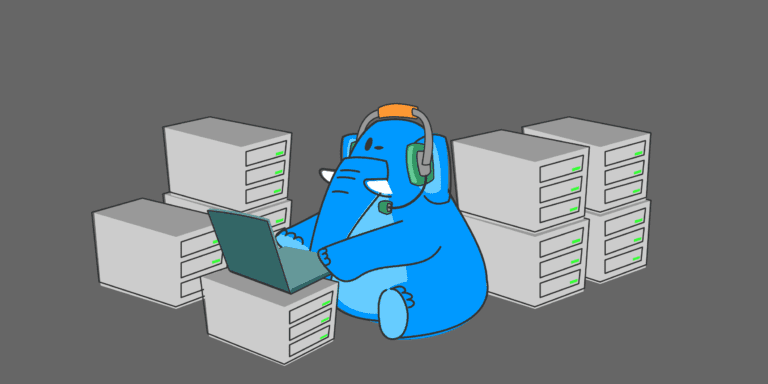Introduction

Why would a web developer be interested in finding the best Node.js hosting provider? There are many reasons for that.
Using scripts on your website helps increase its functionality tremendously. Since it is lightweight and easy to learn, JavaScript is one of the more popular scripting languages in web development.
However, JavaScript is a client-side script so it runs on the website visitor’s computer, specifically in their web browser. Due to security reasons, many organizations and users turn off client-side scripting in their browsers.
When this happens, all the cool JavaScript you wrote for your website doesn’t render for the visitor. Instead, they receive an error message telling them to enable scripts, which sometimes they don’t have the ability to do.
That is where Node.js comes to the rescue. Node.js enables JavaScript on the server side rather than the client side. As a result, all of the scriptings takes place before it hits the visitor’s browser. Even if they have scripting disabled, a visitor will still experience your website as you designed it.
So if Node.js sounds like something your project could benefit from, here’s our guide to finding the best Node.js web hosting.
What is Node.js Hosting?

PHP has a blocking I/O execution model. PHP is synchronous and, unlike JavaScript, it cannot execute the next line of code without the first one being executed.
On the other hand, JavaScript has an event-driven, single-threaded, non-blocking I/O execution model. It is asynchronous, meaning it can run through the entire code simultaneously and not wait for certain functions to be executed. Flexibility, ease of use with JSON (special format to handle data), and DOM manipulation capabilities are the main reasons why many web developers choose JavaScript.
Node.js came up in 2009 as an open-source runtime environment and revolutionized the scene: powered by Google’s V8 JS engine it allowed asynchronous JavaScript programming, which was a major shift in JS, elevating it to the level of more powerful programming languages like Python.
Since then, Node.js has been used by millions of JavaScript developers around the world.
Node.js is a great choice if you have a business that is focused on a dynamic environment and needs to be productive. Node.js is extremely scalable and ideal for building modern apps.
Of course, all web hosting providers allow you to use JavaScript in your HTML. However, not all of them support Node.js. Since all the magic happens on the server side, a web hosting provider needs to support Node.js for things to work properly if you want to use this technology on your website.
Node.js hosting generally comes in two flavors: testing and production. Some of the best Node.js hosting providers offer both options.
The testing environment is generally housed on a lower-speed shared servers. Some of these are free, like Heroku, and others require you to pay for use during development. This second option is typical of a cloud development environment.
Hosting plans set up for testing environments do not provide the computing power to host a fully capable web application. Therefore, once your web app is ready, you need to move it to a production hosting plan.
More often than not, you are going to need a dedicated server or a virtual private server.
Not all Node.js hosts offer servers preconfigured with an installation of Node.js. If you are planning to use this environment, you may need to install the components yourself. Fortunately, all of the best Node.js hosting providers have tutorials on how to do this.
If you follow the steps exactly as they outline them, you will have no trouble getting Node.js up and running on your server.
Who is Node.js Hosting For?

Node.js hosting is not a necessity for every website. In fact, unless you are building a web application in Node.js you would never need to use this type of hosting plan.
So just what kind of sites rely on Node.js? Some of them are the most powerful web apps on the Internet including:
- Netflix
- Walmart
- Groupon
- eBay
- NASA
- PayPal
That’s quite a list and chances are your project won’t be competing be with those services just yet.
Not just for big projects
However, Node.js is not just for large organizations. Many startups choose Node.js as a development platform because it is easy to get their idea into a workable prototype rather quickly.
Basically, Node.js hosting could be suitable for any organization that requires JavaScript for its site to work properly. Whether it is used to deliver dynamic content or the website is a standalone application such as Trello. If the site just won’t work without JavaScript enabled, then you are going to want to look for a good Node.js hosting provider.
For some websites, the elements written in JavaScript are not essential. They may provide alternative content for browsers that have scripting disabled or have other solutions. If this is the case, then you should weigh the pros and cons of Node.js hosting to see if you really need it.
Pros of Node.js Hosting
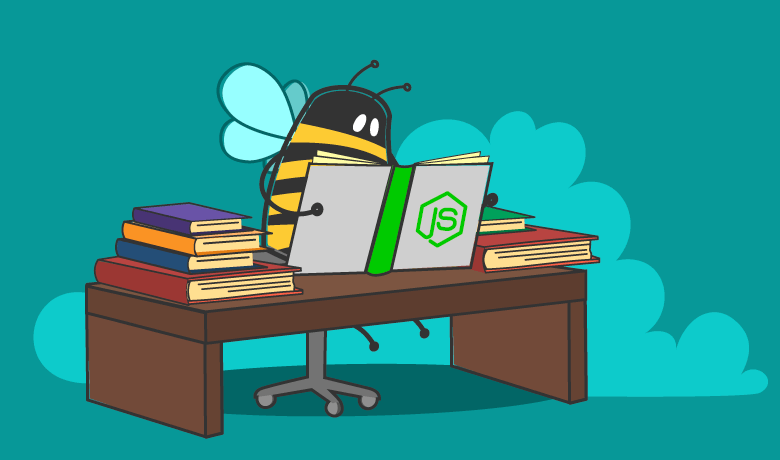
If your website relies on Node.js there are plenty of reasons why you would want to find a provider that offers the best Node.js hosting.
For one, Node.js hosting often requires you to install the required components on your server. Most hosting companies don’t perform this installation for you. The right hosting provider will have tutorials and walkthroughs to assist you with this.
Access to knowledgeable support staff
Another benefit to Node.js hosting is the knowledge their support staff has regarding this specific environment. While other hosting providers likely allow you to install Node.js on a dedicated or virtual private server, if they aren’t familiar with Node.js they may be of little help.
Finally, Node.js has an active developer community. The best Node.js hosting providers are often part of this community since they are dedicated to supporting it. As such, they can point you to the best resources when you need help.
Node.js has some benefits to it as well. If you are looking for a platform to develop a JavaScript-reliant website or web application it is a good choice because:
- It is relatively easy to learn.
- It offers more freedom than Ruby on Rails.
- The full-stack JavaScript environment makes it possible to create the front-end and back-end in one language.
- It handles simultaneous requests more efficiently than Ruby or Python.
However, dedicated Node.js hosting isn’t without its downsides.
Cons of Node.js Hosting
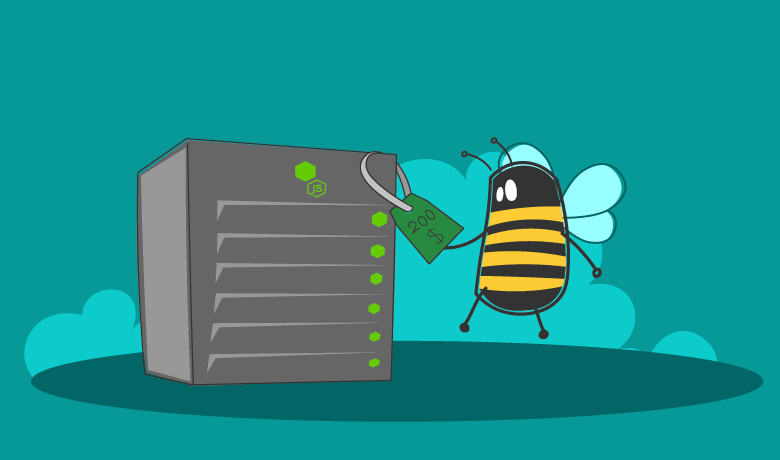
Since most Node.js environments require a dedicated or virtual private server, the cost is one of the biggest drawbacks. These servers, at an entry level, can run as much as $200 a month.
Specialist knowledge required
Node.js hosting also requires you to understand systems engineering. Having to install Node.js on your server by yourself requires a specific skill set. Not only do you have to complete the installation, but you need to manage and secure both Node.js and the server itself.
For people that have little or no experience with systems administration, this can be very intimidating. Especially in the beginning.
Luckily, there are ways to overcome these downsides.
Using a free hosting provider that allows you to set up a staging environment helps delay those costs until you are ready to launch your site or application. For startups and smaller businesses, this is extremely helpful.
Finding a hosting provider with a good track record with support helps with the latter of the two drawbacks. With the right tutorials and experienced support personnel to rely on, the system administration aspect is less daunting.
There is also the community to turn to if you get stuck or have questions regarding your Node.js installation. This will have enormous benefits if you run into trouble and don’t mind digging around for the right answer.
Interested in Node.js hosting but don’t yet have the skills, here are some great places to study Node.js online:
Things to Look for When Choosing a Node.js Host

Throughout this guide, we have mentioned the need for support. This is the first thing you should consider when looking for the best Node.js hosting provider.
User Support
If they have a solid record when it comes to supporting, this is the partner you want to work with. Even if they wind up costing you a bit more each month.
Value
This leads to the next thing you should look for, and that is value. Node.js hosting is not cheap, but that doesn’t mean you shouldn’t expect value. Look for hosting providers that offer flexible plans that meet your price range.
True Node.js support
Finally, you are going to want to find a hosting provider that clearly states they support Node.js. There are certain requirements when it comes to installation. If your hosting server does not meet these requirements, you may not be able to install the necessary components.
What to Pay Attention to When Choosing a Node.js Host

Aside from the things you need to look for, there are some things you must pay attention to when choosing a hosting provider.
Flexibility
Start with flexibility. Will the hosting provider allow you to move from one plan to another when you need to? If they require you to wait until your next billing cycle this could be a major inconvenience if you paid for a year upfront.
Also, investigate the process of moving from one plan to another. It should be seamless. If there are any gaps that could cause downtime, look for another host.
Uptime
Downtime is another area that you need to pay close attention to. The industry-standard service level agreement for web hosting uptime is 99.9%. Nothing less than this is acceptable. Even though Node.js hosting requires some special configurations, everything on the server end should be up and running at all times.
It is important to note, however, that the SLA will likely not cover any downtime due to changes you make. This includes the installation of Node.js. If you don’t follow the guidelines and things are not set up properly, this could result in downtime that is not covered.
Top Node.js Hosting Services

We recommend that you look beyond the most popular web hosting options when buying a Node.js package. If you are looking for this specific type of hosting, consider the following players: Kinsta, Heroku, Digital Ocean, Microsoft Azure, Google Cloud Platform, and Amazon Web Services.
Many of these options can be accessed via cloud-based providers. You will enjoy all the benefits of cloud-based hosting such as easy scalability, redundancy, and support for failover.
Kinsta
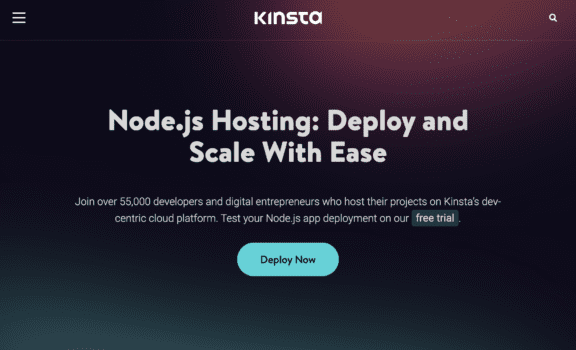
Kinsta offers the ultimate Node.js hosting experience, lightning-fast speeds, unbeatable security, and cost-effectiveness. With no row/query limits and free internal bandwidth, you can focus on coding your app without worrying about any limitations. Google Cloud Platform servers are used to deliver their fastest-available C2 Machines, which can be accessed in your choice of 25 data center locations across 5 continents.
Google powers its network, ensuring that you get the fastest and most reliable service possible. Enterprise-level firewall and DDoS protection by Cloudflare, along with 275+ POPs worldwide, make it possible for you to enjoy the maximum speed at all times.
Kinsta is designed to give you all the support you need. These guys offer 24/7 support on all server pods, so you can get the help you need anytime. You can also deploy your code easily by automatically deploying from GitHub any time you publish new code to your specified branch. And, with custom domains and SSL routing, everything is easy to access and manage on Knsta’s simple, collaboration-friendly UI.
The pricing model is based on usage, so you only pay for what you actually use. Free trial available.
Amazon
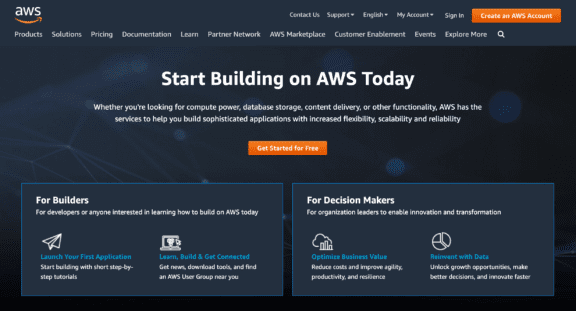
Amazon Web Services, a market-leading cloud platform, is one of the best options to host any Node.js app. AWS has thousands of services to satisfy every need.
It is a cloud-based hosting platform that does away with the need for a physical server. Cloud hosting is preferred by most users because it’s easier to upgrade and maintain.
AWS is extremely easy to use. You just need to upload your code to AWS and let it provision and deploy everything.
To start with AWS you need to provision a Virtual Machine (Amazon EC2), install Node.js and relevant software, or just go with Elastic Beanstalk.
Amazon Elastic Compute Cloud (Amazon EC2) offers the largest and most robust computing platform. With hundreds of computing instances, you have the choice of the best processor, storage, network, operating system. This allows you to match your workload with the best possible. Amazon EC2 is a secure, reliable, high-performance, and affordable compute infrastructure that can meet the most demanding business needs.
Elastic Beanstalk allows you to quickly and easily deploy your application to AWS. Elastic Beanstalk, a flexible service, integrates all the features needed to seamlessly manage and deploy Node.js Web applications. Elastic Beanstalk’s main benefit is that you don’t need to worry at all about infrastructure.
Highlights:
- Load balancing and auto-scaling
- Inbuilt monitoring
- Easy integration with other AWS services
- Pay as you go pricing model
Another option is to go web-based with AWS Lambda.
AWS Lambda is a serverless compute platform that runs your code in the wake of events and automatically manages your underlying compute resources. These events could include changes or updates to the state of your code, such as a user placing an order in a shopping basket on an eCommerce website.
If you aren’t super familiar with AWS yet, you can check out the “Deploy a Node.js Web App” project guide to learn the basics and get your app up and running.
Google Cloud

Google Cloud Platform could be the best Node.js platform if you’re looking for the same infrastructure which powers YouTube and Google Search.
Like Amazon Web Services, Google Cloud gives you the option to select from a wide range of services and products. Google App Engine will be a good choice. It allows you to “focus only on writing code” without having to worry about maintaining the infrastructure. Similarly to AWS, you pay only for the resources you actually use.
There are 4 options:
- App Engine – allows you to use the same infrastructure that Google uses for you. It’s a PaaS option
- Compute Engine – Create a VM using the OS of your choice and then install it in the way that suits you best. The server is yours to manage and you have complete control
- Kubernetes Engine – a simple way to automatically deploy, scale, and manage Kubernetes
- Cloud Run – Serverless solution where you can create your highly scalable containerized applications to run on Google’s infrastructure. You pay for code executions
All of these options offer low latency network and hosting for your application in the same place as Google products.
Need help setting up an account? See this Google’s Node.JS Quick-Start Guide for getting started.
Digital Ocean
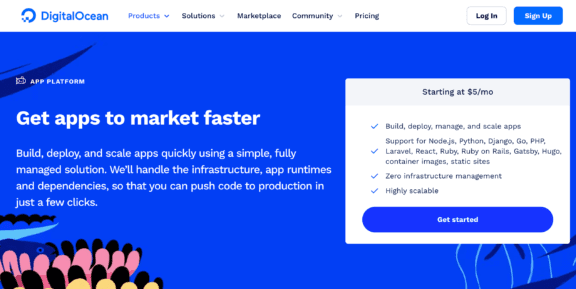
DigitalOcean, a well-known cloud infrastructure provider and a very good option to host Node.js, has a special App Platform for building, deploying, and managing application or APIs. It supports Node.js, Python, Django, Go, PHP, Laravel, React, Ruby, Ruby on Rails, Gatsby, Hugo and apps in other languages.
You can spin up an Ubuntu Node.js droplet in just a few clicks. However, it would be quite difficult to use for inexperienced webmasters as it requires extensive server management.
Highlights:
- DDoS protection
- Cloudflare CDN seamless integration
- Automated HTTPS
- Application metrics
- Horizontal or vertical scaling
Droplets start from as little as $5 per month, and you’ll have your choice of eight different data centers on three different continents.
Microsoft Azure

Microsoft Azure, another well-known cloud computing platform, also offers a range of services that allow you to easily host and deploy Node.js programs.
This of the leading cloud computing platforms have data centers located in 54 locations.
Similar to the and leading web hosting platforms, you also have multiple options:
- Virtual Machines – Provision Linux and Windows servers to set up your environment
- App Service Fully managed platform for deploying your code. Azure will handle the rest
- Azur Functions serverless computing that scales and meets the needs
Microsoft Azure offers another attractive feature: 12 months of core service free, plus $200 credit you can use within your first 30 day. You only pay for what you use.
Heroku
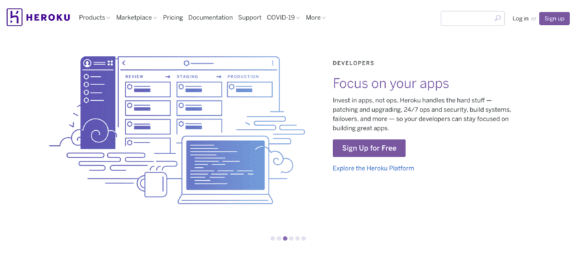
Heroku is well documented, easy-scalable, and a developer-friendly cloud application hosting platform. It supports many languages and environments, including Node.js.
Highlights:
- Seamless integration with third-party partners
- Deployment applications in multiple regions
- The documentation is a delight for both novice developers and more experienced developers
- Many plugins and services available
Heroku is an excellent choice both for developers who are new or experienced, because of its great documentation.
Heroku offers a free test-drive for non-commercial apps, such as proof of concepts, MVPs, and personal projects. Paid plans start from $7 per month.
Conclusion
The decision to use Node.js on your website comes with a number of benefits. However, even the best Node.js hosting is not as easy as working with client-side JavaScript hosting. If this is something you are looking at, make sure you find a hosting provider that will do everything they can to help you through the process.
Your website or application is essential to your business. As a result, you should look for a hosting provider that will treat your site with this mindset. They are out there, you just need to do a bit of research to find the right one for you.
The big cloud infrastructure companies are a good option if you have the technical skills. These services usually provide services that simplify managing your app and take out the tedious infrastructure requirements.
Hope this short guide was helpful and now you can find the perfect platform for your Node.js hosting needs. You can usually get a free trial, so just give them a try.



